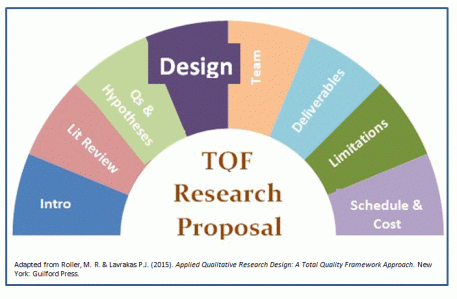A qualitative research proposal is comprised of many pieces and parts that are necessary to convey the researcher’s justification for conducting the research, how the research will be conducted (including the strengths and limitations of the pr oposed approach), as well as what the sponsor of the research can expect in terms of deliverables, timing, and cost. The eight sections of the Total Quality Framework (TQF) proposal are discussed briefly in this 2015 post in Research Design Review. One of the sections in the TQF proposal is Design. This is where the researcher discusses the research method and mode along with Scope and Data Gathering (consistent with the TQF Credibility component), and analysis (including aspects of processing and verification as described by the TQF Analyzability component). Another important part to the Design section is a discussion of the ethical considerations associated with the proposed research.
oposed approach), as well as what the sponsor of the research can expect in terms of deliverables, timing, and cost. The eight sections of the Total Quality Framework (TQF) proposal are discussed briefly in this 2015 post in Research Design Review. One of the sections in the TQF proposal is Design. This is where the researcher discusses the research method and mode along with Scope and Data Gathering (consistent with the TQF Credibility component), and analysis (including aspects of processing and verification as described by the TQF Analyzability component). Another important part to the Design section is a discussion of the ethical considerations associated with the proposed research.
Every research proposal for studying human beings must carefully consider the ethical ramifications of engaging individuals for research purposes, and this is particularly true in the relatively intimate, in-depth nature of qualitative research. It is incumbent on qualitative researchers to honestly assure research participants their confidentiality and right to privacy, safety from harm, and right to terminate their voluntary participation at any time with no untoward repercussions from doing so. The proposal should describe the procedures that will be taken to implement these assurances, including gaining informed consent, gaining approval from the relevant Institutional Review Board, and anonymizing participants’ names, places mentioned, and other potentially identifying information.
Special consideration should be given in the proposal to ethical matters when the proposed research (a) pertains to vulnerable populations such as children or the elderly; (b) concerns a marginalized segment of the population such as people with disabilities, same-sex couples, or the economically disadvantaged; (c) involves covert observation that will be conducted in association with an ethnographic study; or (d) is a narrative study in which the researcher may withhold the full true intent of the research in order not to stifle or bias participants’ telling of their stories.
Furthermore, the researcher should pay particular attention to ethical considerations when writing a proposal for a focus group study. The focus group method (regardless of mode) brings together (typically) a number of strangers who are often asked to offer their candid thoughts on personal and sensitive topics. For this reason (and other reasons, e.g., the moderator may be sharing confidential information with the participants), it is important to gain a signed consent form from all participants; however, the reality is that there is no way the researcher can totally guarantee confidentiality. These and other associated ethical considerations should be discussed in the Design section of the focus group proposal.
Great article! Ethical considerations become even more significant as we incorporate more and more technology.
LikeLike